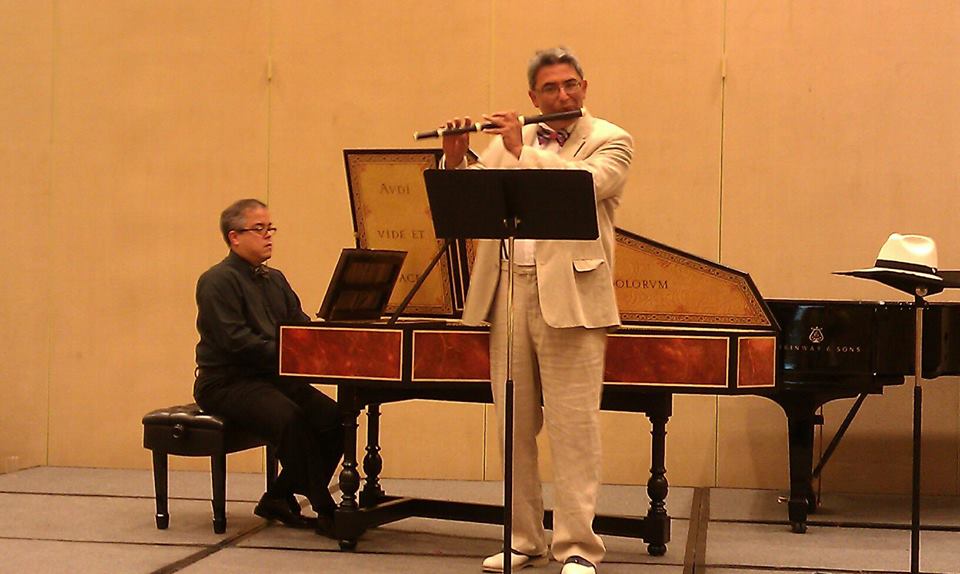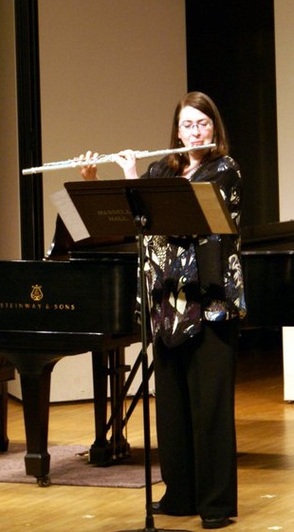Early Music Guild of Seattle gives lesson in historical flute music, from past to present
It was a brief, but deep, history lesson in flute music, from peasant dances to Bach to anti-apartheid jazz, at Seattle’s Town Hall in Jan. of 2004. Musicians Kim Pineda and Shelley Collins demonstrated their flute skills in a program entitled “The Winds of Time.” The concert was sponsored by the Early Music Guild of Seattle (now Early Music Seattle), whose stated purpose is to give “historically informed performances of music from the medieval, Renaissance, baroque, and classical periods.”

Kim Pineda, undated. Image: Marika Pineda.
Flutist Pineda covered the earlier periods of flute history, demonstrating six different wooden flutes. In a whirlwind presentation, Pineda covered the various historical epochs and types of flute music, from church to secular, from court and peasant dances to the “absolute” music of Bach and Mozart. Pineda began by demonstrating a 13th century piece by Raimbaut de Vaqueiras and an anonymous 14th century sacred piece, both of which were performed on a reconstructed medieval flute, only about half the size of a modern flute. The flute was revealed later in the program to be a prototype, in fact made from PVC plumbing painted black.
Next came pieces from the Renaissance era to the Early Baroque and High Baroque periods. These pieces were pleasant but not very complicated, and they were not intended to be. One 16th century piece, for example, consists of only two written lines. It was the musician’s task to continue on this theme and at the same time hold the audience’s and dancers’ attention. Pineda likened the dances to what a lounge player might perform. These are certain “standards” that everyone wanted to hear, and the performer was only allowed so much creative freedom.

Shelley Collins, undated. Image: Shelley Collins.
The later program, performed by Collins, offered much more engaging music from the likes of Bach, Mozart, and Claude Debussy. The Bach piece, “Allemande from BWV 1013,” represented a new development, in that the piece is “absolute” music, created solely for the sake of being music. Collins continued into the Classic, Romantic, and Impressionist Periods, offering theater music by Mozart and program music from Claude Debussy, played on the alto flute, which is one-fourth octave lower than C.
The modern flute was developed by Bavarian goldsmith and industrial engineer Theobald Boehm, who perfected his vision in 1847, according to Collins. Collins specializes in modern flutes and appears just as comfortable on a standard ‘C’ flute as she does on the alto flute and the lumbering bass flute, which is significantly larger and a full octave lower than the standard.
To bring us into the Modern era, Collins performed a very experimental piece by Robert Dick, the “bad boy of the flute world.” Dick’s piece “Lookout” from 1989 requires learning an entirely new set of fingerings, the musical use of “key clicks,” multiphonics (the practice of playing two or more pitches at the same time), and “singing while playing.” If that doesn’t sound complicated enough, the entire piece is structured around Jimi Hendrix guitar riffs.
To close the evening, Pineda and Collins joined forces to perform a special arrangement of Dollar Brand / Abdullah Ibrahim’s “Mannenberg ~ Is Where It’s Happening” (1974), later released in the United States under the title “Cape Town Fringe” (1977). This jazz piece became an anthem of the anti-apartheid movement in South Africa; for more background information please see here. It sounded a bit “off” to the ear because Collins was playing a bass flute and Pineda was playing an 18th century wooden flute. These are very different instruments and their sounds do not immediately mesh together, bit it made for an interesting experiment. Listen to the original Dollar Brand recording below:
The “Winds of Time” program left little to be desired. It was fascinating to see the development of the flute instrument first hand, and the first-class musicianship of Pineda and Collins made the evening well worthwhile. Several aspiring flutists (audience members) mounted the stage to ask technical questions and try some of the instruments out for themselves. Pineda said they were more than happy to try out his instruments but that he couldn’t sterilize them with alcohol because they are made of wood. He cautioned, “Free free to try it, but it is flu season.”
For more general interest music articles, please see:
(This article was originally published by The Sentinel, the newspaper for South Seattle Community College, on Jan. 23, 2004. The Sentinel ceased publication in March of 2011. The Early Music Guild of Seattle is now rebranded as Early Music Seattle. Information about the program and the performers was accurate at the time of writing).
ErikTomrenWrites is a participant in the Amazon Services LLC Associates Program, an affiliate advertising program. Your purchases on Amazon.com via our links will help support ErikTomrenWrites – at no extra cost to you!
Pingback: Sons of Perdition – Trinity (Review) - #ErikTomrenWrites
Pingback: The Streets: A Grand Don't Come For Free (review) - #ErikTomrenWrites